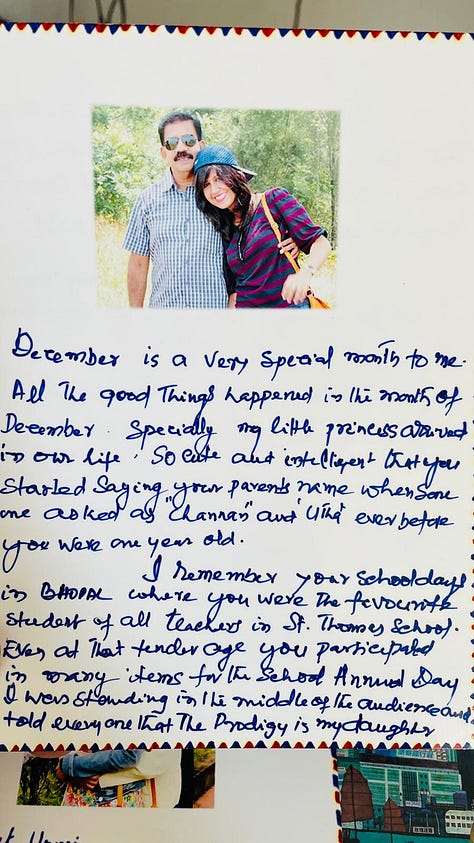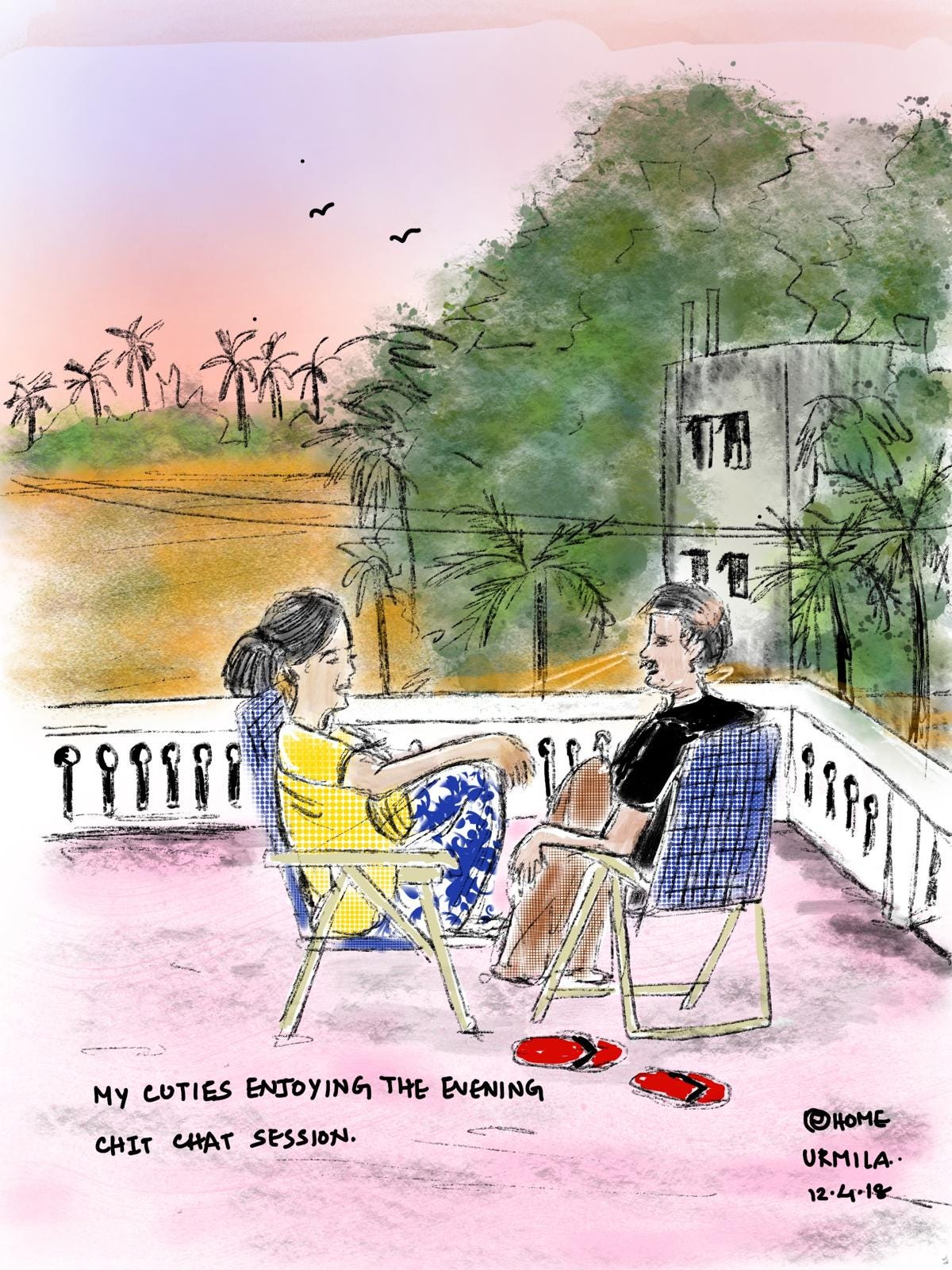The Turbulent Flight Home: Why Every Mile Away Feels Heavier as Our Parents Age
An exploration of love, regret, and the cruel passage of time—because going home isn’t just about distance; it’s about confronting what we can’t hold onto.
The Weight of Leaving
My parents waved a teary goodbye to me once again as I left home after my annual visit. I don’t think I’ll ever fully understand how they must feel saying farewell to a life they gave—a life they sacrificed their wishes for, a life they have so many dreams for. A life that has grown into a strong-willed individual who now demands space against their conditioning, someone whose opinions, choices, and actions might contrast with how they think. But they know that acceptance is the only way to love.
How fortunate I am to always see them showing up—for my school meetings, my dance performances, clapping for my speeches, watching me chase my passions, and standing back to support me in whatever ways they can. Loving me like a child but respecting my choices as an adult. It’s not a dance they are well-versed in, but they’re still learning the steps.



But here’s the thing—I don’t know how many years of these tearful goodbyes I have left.
Turbulence in the Air—and My Heart
A full flight. A crying child. An annoyingly curious kid kicking the back of my seat. The subtle elbow war for the armrest. And then, the air hostess announces turbulence ahead.
But none of that compares to the turbulence brewing inside me—the kind that forms a lump in your throat so thick you can barely swallow. Memories flood my mind like a montage, each frame etched with moments I wish I could freeze forever. Tears stream down my cheeks, soaking tissues as my lips quiver. All I can think about are the unsaid things to my parents—the words left hanging between us, suspended in silence.
Why does the flight back home feel so turbulent? It’s worse every year when I see them age before my eyes. Each visit feels like watching sand slip through an hourglass, grains falling faster than I can catch them.
Regret on Repeat
Every time I land at home, I tell myself this will be different. This time, I’ll focus less on work and more on them. But life has other plans. My dreams demand attention, my deadlines loom large, and somehow, my passion projects always take precedence over quiet afternoons with my parents.
Last year, it was my action research project for my PGDE. The year before, submission deadlines consumed me. This year, it’s my book—a dream I’ve nurtured for years. Yet, every unfinished conversation, every missed opportunity to sit beside them without distraction, haunts me long after I leave.
My parents’ love language is acts of service. They go out of their way to make life easier for me, even now. To be pampered and cared for by them at this stage of their lives feels like both a blessing and a burden. How do I repay such unconditional love when all I seem to offer in return is absence?
The Slow-Setting Sun
Each year, they dim just a little—like the sun slowly sinking below the horizon. My strong-willed mother, once decisive and unshakable, hesitates now, asking me to make decisions she used to handle effortlessly. My gutsy father, who took risks without blinking, sits quietly in the passenger seat of life, realizing his strengths are waning.
Yet, despite their fading vigor, they find ways to care for me. They bring food while I’m working, wait patiently for me to join them for meals, or sit silently on the balcony skywatching, careful not to impose.
One morning, I asked my dad for the iron to iron my shirt. The next day, he came downstairs dripping in sweat, holding my freshly pressed shirt. “Is this okay?” he asked softly.
And my mum—she ensures every food craving I’ve ever had is fulfilled before I leave no matter how tiring it is for her. She declutters the house religiously, saying, “One shouldn’t hoard anything toward the end.” Once was fine but she mentioned this a couple of times which makes my heart waver as my mind quivers thinking of these eventualities of life.
When she said, “Your father might struggle if something happens to me,” my heart froze. The words hung there, suspended between us, too fragile to touch but impossible to ignore. My heart wavered, and my mind quivered at the thought of a life without her steady presence holding everything together. It wasn’t just about what would happen to him—it was about what it meant for me. How do you prepare for the loss of someone who has been your anchor, your safe harbor? How do you face the inevitability of time when all you want is for it to stop?
I felt helpless, small in the shadow of something I couldn’t fight or fix. All I could do was sit there, listening to her voice—a voice that has guided me, comforted me, loved me—and wonder how I’ll ever find my way once it’s gone.
The Weight of Time
Seeing my father’s hair turn completely white hit me like a freight train. Suddenly, responsibility felt heavier. Each wrinkle on their faces became a reminder of the puppeteer—time—and how we’re all mere pawns in its relentless game.






I try to stay patient, but our strong personalities clash. Mood swings flare up, and sometimes, we need space from each other. I realise that I haven’t worked on a lot of things that triggered me as I chose to stay away from home. And that is making me short of patience as I deal with him. With my dad losing his hearing partially, communication grows harder—not just literally but figuratively too. We haven’t always been great at talking openly, and though we both want to mend that now, old habits die hard.
Ageing is cruel. It robs you of flexibility—mental and physical. You become a cog in a machine you built for survival, but the fuel runs low, the oil dries up, and friction sets in. Once effortless things become Herculean tasks. Uncertainty looms: Which part of you will give way first? If there’s a breakdown, will you recover, or will you crumble into non-functional blocks, rusting away until you’re forgotten?
The Unthinkable Reality
Recently, a loved one lost his father. Their relationship wasn’t perfect—they hadn’t spoken openly in years—but grief tore open old wounds. Watching him flail in an ocean of distress reminded me of the fragility of life.
Going home after the death of a parent is a nightmare no one should face. Ever. As I write this, tears blur my vision. My eyes burn red, and my chest feels tight. These emotions paralyze me, making coherent thought impossible. Time sends signals from every direction, warning me of what’s inevitable, yet I stand frozen—a deer caught in headlights.
Now or Never
You think you have forever, but you don’t. All you have is now.
This article may feel unhinged because that’s exactly how these emotions feel— overwhelming, and chaotic. They strip away logic and leave like that sensitive raw and exposed nerve after a dental treatment, vulnerable, and desperate to hold on tighter.
So here’s my plea—to myself and anyone reading this: Go home. Call them. Say the things you’ve been meaning to say. Hold their hands. Look into their eyes. Be present. Because someday, the chair where they sat will be empty, and the only thing left will be memories trapped in frames on walls, quietly witnessing life move forward without them.
Last but not least…
If this resonates with you, share your story in the comments below. This is a safe space to talk about ageing, loss, and the bittersweet beauty of family. And if you’d like more heartfelt reflections like this, consider subscribing to my Substack—it’s where I pour my soul into words, hoping to connect deeply with readers like you.
Thank you for being here. 💔
You think you have forever, but all you have is this, now or never. You don’t know how many tearful goodbyes are left.









I feel this 🩷 just discovering your Substack! Xoxo